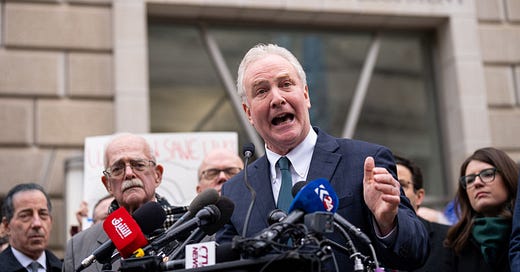
The Free Press

If you want evidence that Democrats have learned nothing from their November 5 shellacking, just watch this video.
It’s from a protest outside the Capitol last week at which Democratic senator Chris Van Hollen of Maryland, one of several top lawmakers in attendance, led chants of “Hey, hey, ho, ho! Elon Musk has got to go!”—and vowed to protect USAID in the courts, or by threatening parliamentary maneuvers against President Trump’s nominees.
In policy terms, the Democrats have a point. The legality of DOGE’s strike on the agency is unclear. For the incredible amount of wasteful stuff in its budget—why did USAID grant $1.5 million for “diversity, equity, and inclusion in Serbia’s workplaces and business communities”—USAID also provides basic aid, like nutrition and health assistance, to needy countries.
But politically, none of that matters a whit. Trump occupies the high ground in this fight, which is probably why he and Musk picked it. If voters dislike anything, it’s bureaucracy and foreign aid. And USAID is a 10,000-employee bureaucracy—housed in a palatial building on prime downtown real estate—that spends $40 billion a year on other countries.
“You don’t fight every fight. You don’t swing at every pitch,” as the former Democratic Chicago mayor Rahm Emanuel told Politico. “And my view is—while I care about the USAID as a former ambassador—that’s not the hill I’m going to die on.”
Skepticism about foreign aid is one of the most consistent and durable findings of public opinion research. In a 2023 AP-NORC poll, 69 percent of respondents thought U.S. government spending in this area was “too much”; 20 percent, “about right”; and just 10 percent “too little.” In contrast, support for more spending in most domestic areas (healthcare, education, infrastructure, Social Security, etc.) is quite strong.
As veterans like Emanuel know, anti–foreign aid sentiment runs highest among working-class voters, precisely the people who have been defecting from the Democrats for Trump, and without whose votes the party cannot recover. Cutting foreign aid spending is about 10 points more popular among voters without college degrees than among the college-educated.
For many of the latter, who constitute the core of the modern Democratic Party, it’s self-evident that spending millions fighting climate change or promoting gender equity abroad serves U.S. interests and discharges a moral obligation.
Chris Van Hollen epitomizes this kind of Democrat. A son of Foreign Service officers, he was born in Pakistan, spent much of his childhood in Asia, and acquired degrees from Swarthmore and Harvard; his first work experience included stints on the Senate Foreign Relations Committee staff. Before winning a Senate seat in 2016, he represented a suburban D.C. House district inhabited by many State Department and USAID officials.
Defenders of foreign aid usually respond to critics by lecturing them that it represents no more than 1 percent of federal spending, and therefore they should look elsewhere to balance the budget. This argument totally misses the point that taxpayers place a higher priority on unmet needs at home.
Americans are willing to help alleviate genuine suffering abroad, and to do so generously, but want to be assured the government has already done its best to take care of domestic needs. USAID’s budget would cover the $23 billion maintenance backlog at the national parks, for example, with money left over.
In response to such concerns, the “only 1 percent” line provides nothing but a patronizing non sequitur.
As David Axelrod remarked to Politico, regarding the USAID battle, “Democrats have become—in the minds of a lot of voters—an elite party, and to a lot of folks who are trying to scuffle out there and get along, this will seem like an elite passion.”
Okay, let’s recap the situation:
1. Democrats are unconditionally defending an obscure government institution at a time when even well-known and previously trusted institutions are regarded with intense suspicion. A key finding from New York Times polling in the 2024 election cycle was that voters overwhelmingly believe the political and economic system in America needs either major changes, or to be completely rebuilt.
2. This particular obscure institution does one of American voters’ least favorite things: provide foreign aid.
3. Finally, not only are Democrats blanket defending an obscure institution that does something American voters don’t particularly want to, they are defending it without explaining their own priorities. What aid would they preserve and what would they get rid of? It is a legitimate issue, in light of concerns about USAID, which is not a “criminal organization,” as Musk called it, but does have long-standing issues with efficiency and focus.
Voters might listen to Democrats who approached foreign assistance in the spirit that President Bill Clinton approached affirmative action: “Mend it, don’t end it.”
That spirit of open reform will be desperately needed across all issue areas as Democrats try to counter Trump’s excesses.
He is guaranteed to do many things that are genuinely unpopular and impinge upon voters’ lives in areas like healthcare, education, and the cost of living. Democrats should keep their powder dry for those fights.
That could make them politically stronger over time and conceivably even better able to restore essential foreign assistance programs. Grandstanding in an unequivocal defense of USAID, by contrast, provides a frisson of #Resistance feeling—and little else.



